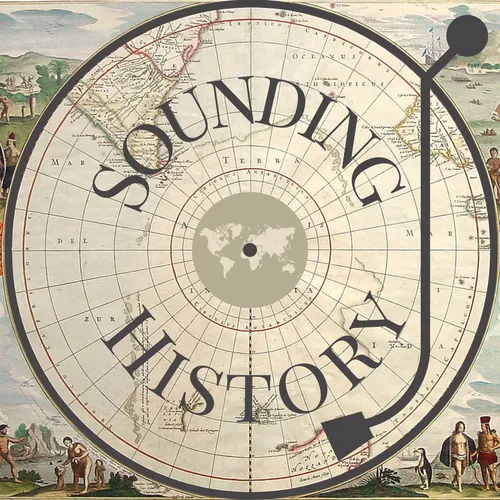
Sounding History
Sounding History is a podcast about the global history of music with an unexpected twist. Your hosts, music historians Tom Irvine and Chris Smith, explore sonic impacts of the extraction of resources from the Earth’s environment. Instead of narrating music history as a story about performers, composers, and works, we explore how extraction economy (and the historical processes that came with it, such as settler colonialism, enslavement, and environmental destruction) made the world of sound we live in today.
In each episode we introduce two "postcards": sonic micro-histories that illustrate how music can be understood through stories about labor (how we work), energy (how we power their lives), and data (how we consume and transfer information). We use this categories to explore new layers of narrative about music on a global scale. Our goal is a music history for a new era: the Anthropocene, the age of human-generated climate change.
We work as researchers and university teachers in the US and Britain. But between us we have long experience outside of the ivory tower, as musicians in styles from folk to early music, as radio hosts, and public speakers. In Sounding History we turn to the new medium of podcasting, looking to share with listeners stories about people and their soundworlds that have not been heard before.
Tom teaches at the University of Southampton in the UK and is also a Fellow of the Alan Turing Institute, the UK's national research institute for data science and AI. Chris directs the Vernacular Music Center at Texas Tech University. Between us we have written and edited books about the history of music and dance in the United States, the soundscapes of the Western Encounter with China, and the global history of German music. Sounding History, and the book project that goes with it (a global music history of music for general readers). Sounding History is not our first collaboration. Decades ago, we worked together in public radio and performed together in early music ensembles, laying a groundwork of curiosity and spontaneity for our partnership today. Join us as we take up this new collaboration, a music history for our times.
- Update frequency
- every 6 days
- Average duration
- 38 minutes
- Episodes
- 8
- Years Active
- 2021

Data in the Anthropocene: Music's Carbon Footprint & the Environmental Endgame
Kyle Devine’s 2019 book Decomposed: A Political Ecology of Music is making waves. As Devine explains, the book started as an investigation of the nostalgic return of the vinyl record, a seemingly “ba…

Soundscapes of War and Worship: Mozart and the Call to Prayer
We begin with a famous (and very beautiful) aria from the Abduction from the Seraglio K. 384 by Wolfgang Amadé Mozart (Mozart nerd alert: he never called himself “Amadeus,” ever, and we aren’t going …

Sound Sculpting in East Asia & the American South
Grace Chang (Ge Lan, 葛蘭/葛兰), (born 1933) was a breakthrough star in one of several Golden Ages of Hong Cinema, this one around around 1960. For a comparatively short time between the mid fifties and…

Soundtracks of Imperial Power in Europe and Africa
Comparing cultural expressions is a risky enterprise: especially, in our case, because too many still perceive Western “classical” art music to be somehow superior to other musics because of its a…

Sounding Stone and Cetacean Energy
This episode is about what happens when sounds and people meet and mix. A lot of what we talk about takes place away from North America and Europe, but we end up circling back to a primary question i…

New Soundworlds on Canals & Computers
The machines that make the biggest difference are the ones that make things move and bring people together. This week, our postcards take us to critical moments in the history of technology: the comp…

Caribbean Dance, London Symphonies & The Triangular Trade
Colonialism reconfigured the world economy around the extraction of natural resources and the exploitation of humans to provide the labor for that extraction. A by-product was profound change to how …

Welcome to Sounding History!
Every collaboration has a backstory. Ours goes back nearly 30 years, when Chris (the older one, jazz musician, former line-cook and nightclub bouncer, some tattoos) and Tom (the slightly younger one,…